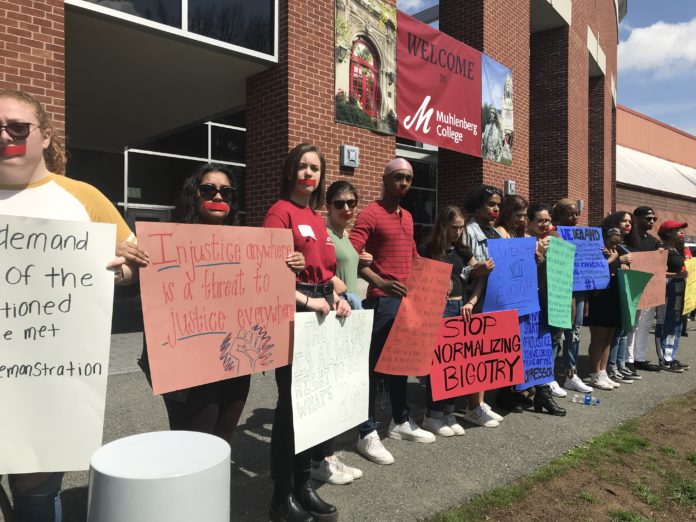
On college campuses across the country, there has been an uptick in protests and demonstrations. On Nov. 8, twenty students from Brown University were arrested and charged with willful trespass after hosting a sit-in at University Hall, demanding that their University’s president, Christina Paxson, “commit to supporting a divestment of the University’s endowment from ‘companies that enable war crimes in Gaza,’” explained The Brown Daily Herald. And while those charges have since been dropped, it begs college students to wonder how much their constitutional right to free speech is protected at private institutions. The Weekly decided to take a look at Muhlenberg’s own protest policy, formally known as the Student Demonstration Policy, which addresses the extent of students’ right to dissent on Muhlenberg’s campus.
After years of drafts, this policy was recently updated in Aug. 2022. Dean of Students Allison Williams shared, “The College has had a policy for dissent on campus for many years similar to all other institutions across the country. This policy was revised in 2018-2019 to 1) change the tone of the policy to be more affirmative of student’s right to dissent on campus (it used to be called the Protest policy), 2) to be more explicit so that student groups would have a better sense of what would be “allowed” or “not allowed” and 3) to make sure it fully aligned with the College’s code of conduct and freedom of expression policy.” The Weekly was unable to locate the text of the original policy to determine the revisions.
For those who haven’t read it, here are a few highlights of Muhlenberg’s current protest policy. Students cannot: “Interfere with the activities of others on campus; Interfere with College business or activities; Disrupt scheduled College ceremonies or College-sponsored or approved events; Cause a safety issue for others in the immediate vicinity or; Impede traffic or block traffic flow on campus or between campus locations.”
Assuming that students abide by these rules, they will be protected by the College. However, the policy does not specify what constitutes a safety issue or what would be considered interfering with a campus activity. If this policy is violated, there is a list of ways the College will respond to the protest, which could include getting campus safety involved or the Allentown Police.
After conducting an informal survey of 100 Muhlenberg students, 96% did not know of the existence of this policy. This is surprising as the older drafts of this policy actually incited protests of their own.
In 2015, former President Randy Helm drafted a student demonstration policy in the “wake of recent campus demonstrations,” as stated in his “Discussion Draft of Protest and Demonstration Policy.” Helm is referring to a sit-in that took place in Seegers Union where students protested Police Officer Daniel Pantello’s exoneration of the death of Eric Garner. When this draft emerged, students and faculty alike were outraged.
Several petitions circulated on Muhlenberg’s campus. One petition created by the students stated, “This draft by common consensus was found to be vague, restrictive to constitutional rights, and developed through a problematic policy process.” A student in the Apr. 30, 2015 edition of The Muhlenberg Weekly said, “I don’t believe this policy is in any way conducive to the articulation of free speech.” Due to these protests, Helm pushed the drafting of the policy onto the incoming President John Williams who did not pursue its implementation.
According to Dean Williams, the current protest policy is “designed to keep our students, faculty and staff safe, and to make it clear that the right to express dissenting views and engage in freedom of expression demonstrations is critical at Muhlenberg. The policy mirrors our student conduct process with violations only occurring when there is harm to self, others, property or to the community as a whole. It also sets forth boundaries on how, when and where demonstrations can occur to allow for the business of the College to be able to continue and for the demonstration to happen without being interfered with or shut down.”
Some examples of protests possible on Muhlenberg’s campus include: “Standing silently while holding signs at a College-sponsored lecture that is open to the campus (while still allowing the lecture to continue without disruption); Organizing a walk-out from class or a sit-in in a public space on campus (while still allowing access to College functions for others); and Holding a march across campus or reserving a space for a speak-out to occur.”
Since this revision in August of 2022, there have not been any campus protests and so it remains to be seen how this policy will impact future protests here at Muhlenberg.
Keanna Peña '25 is an English and Creative Writing major with a minor in Dance. She is a managing editor for The Weekly and loves writing about student events on campus and sharing her poetry.





















